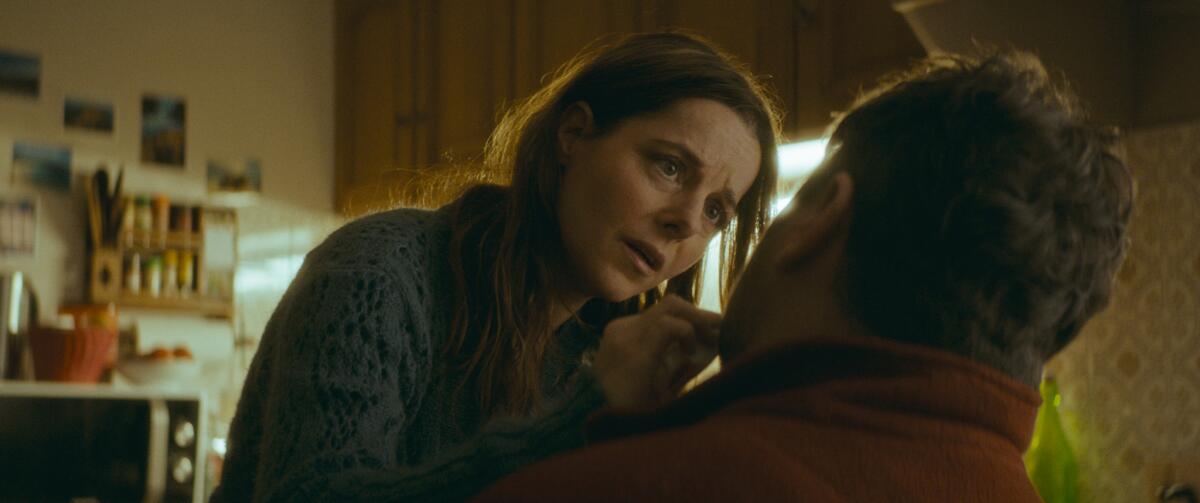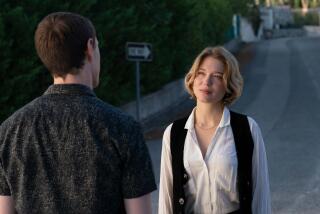Review: French thriller ‘Only the Animals’ connects love, desire and deceit across time

- Share via
The Times is committed to reviewing theatrical film releases during the COVID-19 pandemic. Because moviegoing carries risks during this time, we remind readers to follow health and safety guidelines as outlined by the Centers for Disease Control and Prevention and local health officials.
The twin engines of most mystery stories are what-happened-when and what-happens-next, usually operating in sync, and hopefully without too much rattling. The French thriller “Only the Animals” — which starts with a disappearance and ends with a separate and curious reappearance — is, in that respect, not an entirely humming machine, but one that’s been well-oiled enough to make for an engrossing ride through some intriguing thickets of love, desire and deceit.
Writer-director Dominik Moll is no stranger to the allure of an unforced creep, having cut his teeth on the Chabrol-esque squirmers “With a Friend Like Harry” and “Lemming.” Here, adapting a Colin Niel novel with co-screenwriter Gilles Marchand, he’s working with a temporally discrete structure well-suited to the kind of perspective gamesmanship cinema welcomes, and that has attracted filmmakers from Kurosawa to Tarantino. “Only the Animals” isn’t out to disorient, however — it’s a story it would like you to follow, first and foremost — but viewers are asked to do some mental stitching as its five sections, each built around a character, play out across a mostly similar time frame.
It’s also with deliberate teasing that the first images are of a young man with a bleating goat strapped to his back, bicycling through the Ivory Coast city of Abidjan, after which we’re transported to the high, snow-covered, unforgiving plains of southern France, and a cheerful insurance agent named Alice (Laure Calamy) making her rounds on the Causse Méjean’s winding roads. Our first sense of emotional disconnect in the film is how she concludes her visit with lonely, hollow-eyed farmer Joseph (Damien Bonnard), still grieving the loss of the mother he lived with — the affair he is having with Alice is clearly something she wants more than he does.
Back home at her own farm, where her marriage to Michel (Denis Ménochet) is cordial but tense, we hear of a local person’s disappearance during a recent blizzard, and Alice begins to encounter some suspicious occurrences regarding the men in her life. When the movie pivots to Joseph’s point of view — chapters are titled with a character’s name — the story has backtracked to before the start of how we met Alice. By the time we’ve reached a scene we know — his indulging of Alice’s sexual overtures in his kitchen — we know a little bit more about why Joseph is not exactly fully engaged.
So goes the forward/backward/shift/repeat construct of “Only the Animals,” which also introduces us to a torrid affair between Marion (Nadia Tereszkiewicz), a young waitress in a French port city, and a wealthy traveler named Evelyne (Valeria Bruni Tedeschi), and then provides a fuller picture of that Abidjan lad, Armand (Guy Roger “Bibisse” N’drin), an internet scammer eager to win back his true love (Marie Amie).
If it sounds critical to say that the resolution of the murder at the center of the narrative is the least interesting aspect of the movie’s intrigue, that isn’t necessarily a bad thing. With each brush-stroked relationship a larger theme emerges of love’s susceptibility to signal confusion and dangerous impulse that is well acted by the cast — there’s not a bad performance in this wide web. Moll’s direction also subtly ties these portraits of infatuation to other pressures (isolation, debt, marriage, grief).
Getting to that point, however — where the draw of character complexity is on equal standing with one’s need to see an overarching mystery explained — is where “Only the Animals” can struggle, especially in getting its footing. Gimmicks related to undisclosed information aren’t always the easiest to square when trying to build tension. More reliably solicitous to the mood of psychological intrigue is Patrick Ghiringhelli’s cinematography, never blandly picturesque (although the Causses are mighty scenic), and always attuned to the relationship between a desperate person and their environment, whether thrillingly private or suddenly oppressive.
'Only the Animals”
Not rated
In French with English subtitles
Running time: 1 hour, 57 minutes
Playing: Starts Oct. 29, Landmark Nuart, West Los Angeles
More to Read
Only good movies
Get the Indie Focus newsletter, Mark Olsen's weekly guide to the world of cinema.
You may occasionally receive promotional content from the Los Angeles Times.










